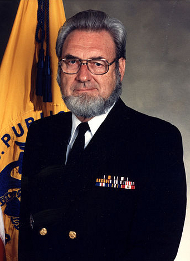In Memoriam: C. Everett KoopMarch 13, 2013
Amidst all of the (entirely proper) agitation about the unusual act of resignation by Pope Benedict XVI, we should not forget another most significant passage. Dr. C. Everett Koop, known affectionately as “Chick,” went to be with his Lord February 25, 2013, at the age of 96. Our hearts go out to his family. He is survived by his wife, Cora Hogue Koop, a friend of many of ours, (his first wife, Elizabeth, predeceased him by 13 years), and by his three children, Allen, Norman and Elizabeth (his son David died tragically in a mountain-climbing accident while still in college). He has eight grandchildren as well. Dr. Koop was a distinguished pediatric surgeon in Philadelphia at Children’s Hospital, serving as surgeon-in-chief at “CHOP” from 1946 to 1981. He was then appointed Surgeon General under President Ronald Reagan. While his confirmation hearings were long and difficult, in the end he passed rather easily, mostly because of his palpable integrity. During his eight years of public service he became a household name. Hitherto the Surgeon General was not a high-profile position. All that changed under Everett Koop. Koop was vehemently opposed to abortion on demand. Together with Francis Schaeffer, he produced a film and a book, Whatever Happened to the Human Race? The two warned against easy abortions, euthanasia and infanticide. Considered by many to be alarmist when published, time has proven them all too realistic. Of the practice of medicine, Koop once remarked: “Perhaps more than the law, I fear the attitude of our profession in sanctioning infanticide and in moving inexorably down the road from abortion to infanticide, to the destruction of a child who is socially embarrassing, to you-name-it.” At the same time, Koop refused to use his office as a bully pulpit for the abolition of abortion. The two campaigns which gained him renown were his outspoken drives against smoking, and against the HIV-AIDS epidemic. Of tobacco’s harm, he famously described how smoking killed 100,000 Americans each year, and how smoking a pack a day will take six years off a person’s life. For this he was fiercely opposed by the tobacco lobby. However, he stood his ground, and the number of smokers in America went from one third down to one quarter of the population. On AIDS, he was nearly alone in urging government to take a stronger stand against its ravages. It eventually came to its senses, and began to act. Dr. Koop became a believer in Jesus Christ through the ministry of Tenth Presbyterian Church, while he was in Philadelphia. He was an elder there and great supporter of the church. He remained a staunch, Reformed evangelical throughout his life. As one might expect of a leader who had strong convictions, not everyone could agree with him or remain supportive. Many evangelicals were quite taken aback when he came out against testing for AIDS, and in favor of the use of condoms, and of sex education for children. They often forgot to read the fine print. Testing could easily ruin careers. And Koop’s first remedy against AIDS was faithfulness or abstinence. Only when a problem still remained would it be appropriate to curtail further damage with the use of contraceptives. He also angered pro-life conservatives when he found out through a careful study that properly performed abortions did not necessarily lead to mental or physical health problems for the mother, as many had loved to argue. (Needless to say, his stands on various matters do not necessarily represent any official view from Westminster Seminary.) As a friend of mine from Tenth Presbyterian Church pointed out, busy though he was, Dr. Koop always had time for people. He was never, seemingly, in a rush to move on, but spent generous time counseling and advising whoever might ask. In a day when so often evangelicals have become all-too-predictable, it is refreshing to remember Dr. Koop’s refusal to be co-opted by any one faction. In a day when evangelicals have very little representation in public places, it is good to remember how one man changed much of American society through his insistent pleading about threats to life and health. In a day when many figures will use just about any argument to support their cause, it is good to remember the honesty of a man who tried to be entirely fair to the views he opposed. May we see the likes of him again! William Edgar, professor of Apologetics |






